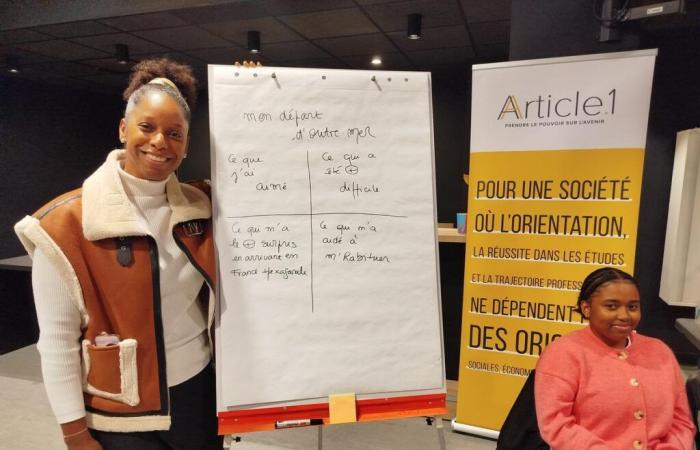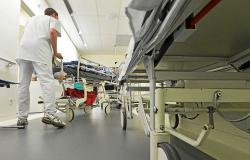
Malia Metella won the silver medal in 2004 at the Athens Olympic Games in the 50 meter freestyle. But, Monday January 20, she did not come to talk about herself. She was first there to listen. The swimming champion traveled from Paris to meet, at her request, young people from overseas who are studying in Bordeaux or on surrounding campuses. There were 17 of them sitting in a circle around her in a room at the René-Maran university residence, in Pessac, for workshops.
Thanks to a partnership between the Crous Bordeaux-Aquitaine and the national association Article 1, they were able to find accommodation on this site. This support program is called Ma1son. “There are five of these houses in France,” indicates its national coordinator, Olivier Geslin. The first opened in 2022 in Paris. » The others are in Créteil, Vénissieux, Rennes and, since last September, in the Bordeaux area.
It welcomes 60 students, 26 of whom are from overseas. Some are from Guyana, like Malia Metella, others from Martinique, Guadeloupe, Réunion, New Caledonia and even Mayotte. They are not housed in a single location, but spread across three nearby buildings. By 2026, there will be 320 nationally to have benefited from this system financed by private funds, then reimbursed by the State in the event of proven effectiveness, including one in two from overseas.
Daily realities
“They are all young people who come from working-class backgrounds, exclusively scholarship holders,” explains Olivier Geslin. Our idea is to slow down social determinism. » An official statistic: “At the Master’s level, only 4% of students are the sons of workers,” underlines Ségolène Bunel, the head of Article 1 for Nouvelle-Aquitaine. The name of this association comes from the Declaration of the Rights of Man and of the Citizen of 1789, article 1 of which begins as follows: “Men are born and remain free and equal in rights. »
In Bordeaux, the Ma1son program benefits a total of 60 students.
E. C.
The exchange between the students and their prestigious interlocutor was intended to be simple, relaxed and focused on everyday realities. Through her cheerful nature and her great, unfeigned attention to others, Malia Metella, who after training in accounting, commerce and then marketing, went to journalism school, knew how to put everyone at ease. To break the ice, they were asked to share their experience so far from home, in the following aspects: “What I liked, what was more difficult, what surprised me the most upon arriving in mainland France, which helped me get used to it. »
-Most of them addressed the question of prices, with this leitmotif: “Here, it's cheaper than in the country. » In 2000, when she left Cayenne to join the National Institute of Sport, Expertise and Performance (Insep), in the Bois de Vincennes, Malia Metella also noticed it. A dairy product she enjoyed was much more expensive in Guyana. “You multiply by four,” she will say aside for this specific case. Nina, who studies international law, has difficulty getting used to cooking: “In Guadeloupe, I was used to eating very spicy foods. Here, rather than going to the university restaurant, I cook at home. I reproduce the dishes that my mother made for me. » Another shared feeling: “Overcoming the absence of family. »
Mayotte
Today, smartphones somewhat counterbalance the distance. The former vice-world champion was not so lucky: “There was a telephone box at the entrance to Insep. At 8:30 p.m., I called my mother in Guyana to give her some news. I tried to use a maximum of five to ten units, because it went by very quickly. Later, I was able to buy a cell phone with the bonuses I earned. But Overseas was out of the package. »
Halima, who focused on the health and social sector, experienced a traumatic ordeal during this already difficult period of adaptation: the cyclone which ravaged her island, Mayotte. “For one to two weeks, there was really no communication,” she says. I had no news from my father. I was stressed. I couldn't go to class. I had heard that in my neighborhood there were people who had died. I finally managed to contact him. Only material damage. »
Article 1 doesn't just care about housing. The young people receiving assistance must carry out a project. In Paris for example, in conjunction with a municipal social action center, they offered a day of relaxation to around ten “single mothers” from neighboring buildings, with a restaurant and a manicure session, while taking care of looking after their children. children. This range of actions makes these students immediately feel less alone.





